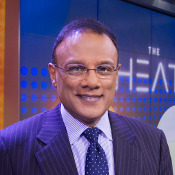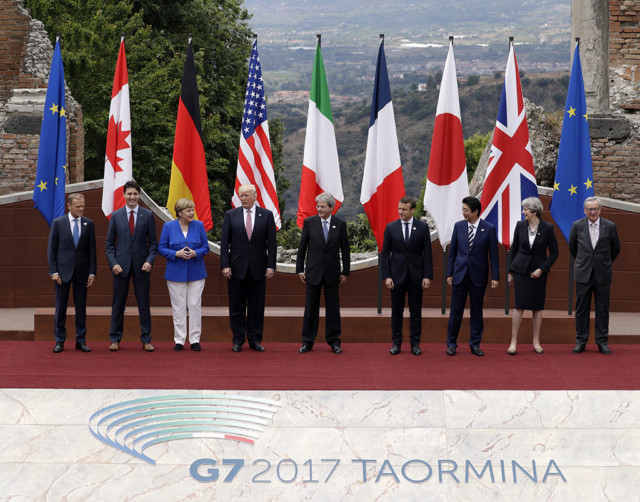Leaders from the Group of Seven nations hold a two-day summit in Italy. What was on the G7 agenda, and was anything accomplished?
It was the first time that United States President Donald Trump has attended. Britain’s Prime Minister Teresa May, and the newly-elected French President, Emmanuel Macron, were also making their first appearance as leaders of their countries.
Major topics like terrorism and trade were on the agenda.
But it was climate change that made the headlines after Trump failed to commit the U.S. to the 2015 Paris Agreement on curbing carbon emissions. That caused a split with the other G-7 leaders.
Meanwhile, the host country, Italy, sought to highlight the migration and humanitarian crisis that has seen hundreds of people dying in the Mediterranean Sea while attempting to reach Europe. And there was a special session on Africa and how it can benefit from relations with the G-7.
Tonight’s panel takes a look at the G-7 Summit in Sicily over the weekend:
- Matteo Garavoglia, non-resident fellow at the Brookings Institution Center on the United States and Europe.
- Afshin Molavi, senior fellow at the John’s Hopkins School of Advanced International Studies.
- Vladimir Golstein, analyst on Russian foreign policy and professor of Slavic Studies at Brown University.
- Hafed Al-Ghwell, columnist with the Gulf News and Al Jazeera, and expert on the political economies of North Africa.
 CGTN America
CGTN America
 In this May 26, 2017, photo, leaders of the G7, from left, European Council President Donald Tusk, Canadian Prime Minister Justin Trudeau, German Chancellor Angela Merkel, U.S. President Donald J. Trump, Italian Prime Minister Paolo Gentiloni, French President Emmanuel Macron, Japan’s Prime Minister Shinzo Abe, British Prime Minister Theresa May and European Commission President Jean-Claude Juncker pose during a group photo for the G7 summit in the Ancient Theatre of Taormina ( 3rd century BC) in the Sicilian citadel of Taormina, Italy. As he dashed through the Middle East and Europe, Trump looked like a conventional American leader abroad. He solemnly laid a wreath at a Holocaust memorial in Jerusalem, had an audience with the pope at the Vatican and stood center stage with Western allies at the annual summits that dominate the diplomatic calendar. But when Trump spoke, he sounded like anything but a typical U.S. president. (AP Photo/Andrew Medichini)
In this May 26, 2017, photo, leaders of the G7, from left, European Council President Donald Tusk, Canadian Prime Minister Justin Trudeau, German Chancellor Angela Merkel, U.S. President Donald J. Trump, Italian Prime Minister Paolo Gentiloni, French President Emmanuel Macron, Japan’s Prime Minister Shinzo Abe, British Prime Minister Theresa May and European Commission President Jean-Claude Juncker pose during a group photo for the G7 summit in the Ancient Theatre of Taormina ( 3rd century BC) in the Sicilian citadel of Taormina, Italy. As he dashed through the Middle East and Europe, Trump looked like a conventional American leader abroad. He solemnly laid a wreath at a Holocaust memorial in Jerusalem, had an audience with the pope at the Vatican and stood center stage with Western allies at the annual summits that dominate the diplomatic calendar. But when Trump spoke, he sounded like anything but a typical U.S. president. (AP Photo/Andrew Medichini)
